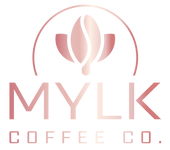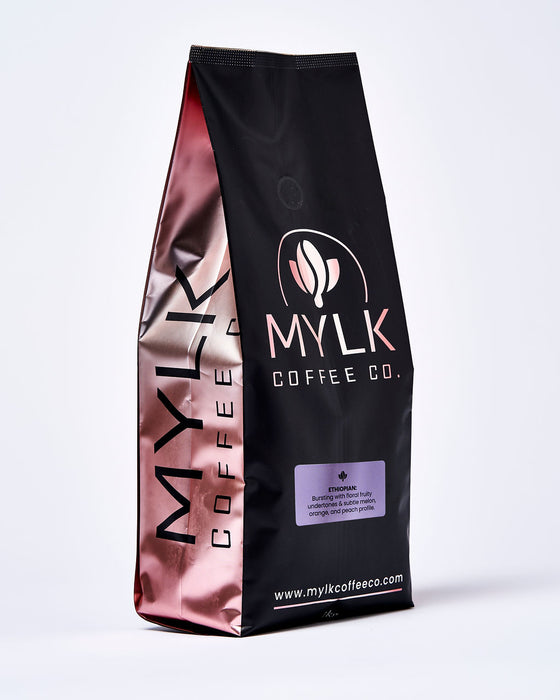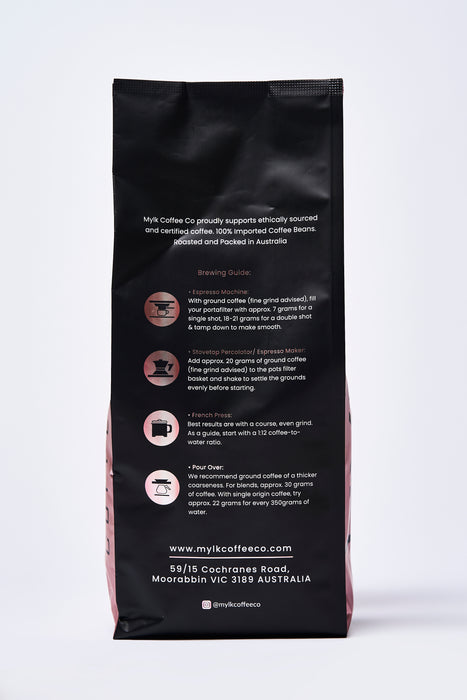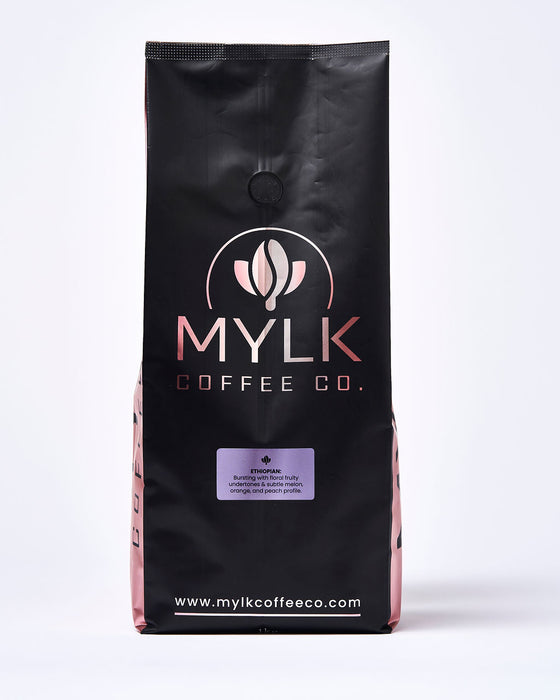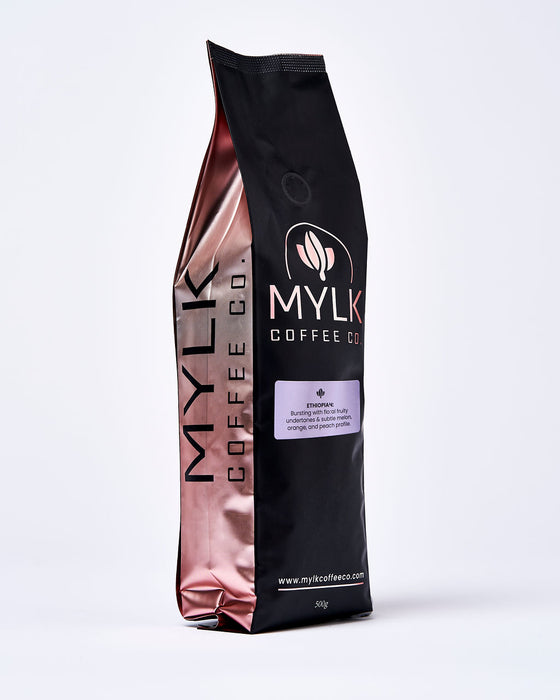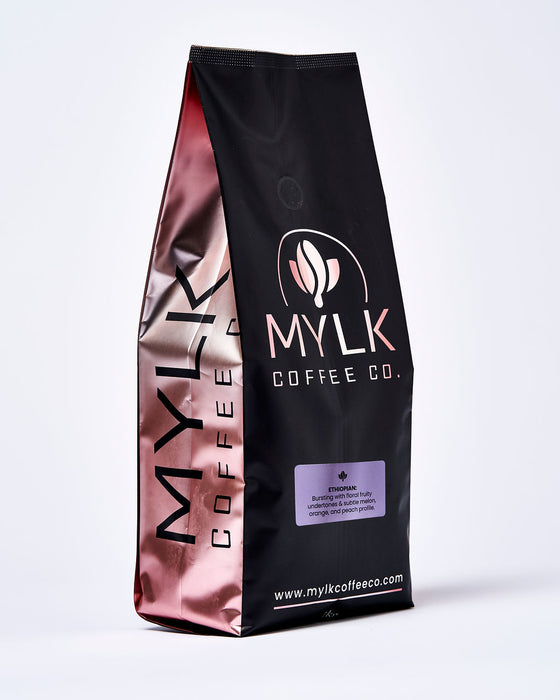
Ethiopian Coffee Beans
Bursting with floral fruity undertones, our single-origin Ethiopian Coffee Beans embrace a subtle melon, orange and peach profile. These coffee beans produce a creamy texture with a rich, syrupy body and a long balanced finish.
REGION/AREA: Kaffa, Ethiopia
FARM: Limou
PROCESS METHOD: Fully Washed
Why Ethiopian Coffee Beans are so Popular
Ethiopia is renowned for its exceptional coffee, with the Kaffa region being one of the most notable areas for coffee production in the country. Ethiopian coffee is grown in different regions across the country, each with a flavour profile unique to that area. The Kaffa region produces some of the most sought-after coffee beans globally.
Picking Ethiopian coffee beans from the Kaffa region is a delicate process that requires skill and experience. The coffee trees grow in the forest, and the beans are harvested by hand, making it a labour-intensive process. During the harvest season, coffee pickers select only the ripest beans, ensuring that only the highest quality beans make it into the final product. The beans are then washed, dried, and sorted by size, creating a consistent flavour profile in each batch.
One of the unique features of Ethiopian coffee beans from the Kaffa region is their distinct flavour profile. The beans are known for their bright and fruity flavour notes, with a hint of sweetness and acidity. The coffee has a medium to light body, making it easy to drink, with a pleasant aroma that leaves a lasting impression on the palate. The flavour profile of the Kaffa region coffee beans is so unique that it has earned the region a reputation as one of the world's best coffee-producing areas.
Coffee lovers appreciate the rich history and culture surrounding the production of these beans. Ethiopia is the birthplace of coffee, and the country's long history with coffee production has resulted in the development of unique coffee varieties, including those found in the Kaffa region. Coffee enthusiasts are drawn to the unique flavour notes found in Ethiopian coffee beans, with the Kaffa region beans being some of the most prized.
Ethical Picking Practices
Ethical practices are an essential part of coffee production in Ethiopia, with many coffee farms employing fair trade and sustainable farming practices. The Ethiopian government has also implemented policies that prioritize sustainable agriculture, protecting the environment and ensuring the well-being of farmers and workers. Many coffee farms in the Kaffa region are small family-owned businesses, and the farmers take pride in producing high-quality beans while maintaining ethical and sustainable practices. By supporting these farmers and purchasing Ethiopian coffee beans, consumers are supporting sustainable and ethical agriculture practices and helping to preserve the unique cultures of Ethiopia.
Summary
In conclusion, Ethiopian coffee beans from the Kaffa region are some of the most sought-after coffee beans globally. The unique flavour profile, labour-intensive harvesting process, and ethical production practices make these beans highly desirable among coffee enthusiasts. The bright and fruity flavour notes, coupled with a medium to light body and pleasant aroma, make Ethiopian coffee a crowd favourite amongst coffee lovers. The Kaffa region's rich history and culture surrounding coffee production have contributed to the development of unique coffee varieties that have earned the region a reputation as one of the world's best coffee-producing areas. By supporting sustainable and ethical coffee production practices in Ethiopia, consumers can help to preserve these unique flavours and cultures for future generations to enjoy.
Home Brewing Guide
Espresso machine
With ground coffee (fine grind advised), fill your portafilter with approx. 7 grams for a single shot, and 18-21 grams for a double shot. Gently tamp down to make smooth and even.
Stovetop Percolator/ Espresso Maker
Add approximately 20 grams of ground coffee (fine grind advised) to the pot's filter basket and shake to settle the grounds evenly before starting. No need to tamp down hard when filling the basket.
French Press
Best results are with a course, even grind. As a guide, start with a 1:12 coffee-to-water ratio.
Pour Over
We recommend ground coffee of a thicker coarseness. For blends, approximately 30 grams of coffee. With single origin coffee, try approximately 22 grams for every 350 grams of water.
Grading, Cupping & Scores
Specialty Coffee often has references to coffee grading and coffee cupping scores.
How is Coffee Graded?
Coffee beans are graded to judge the relationship between coffee beans with imperfections and the resulting coffee’s quality. Coffee is rated on a scale of one to five based on the number of defects in the beans. Examples of primary defects include sour beans, a pod or cherry, or stones or sticks found in the batch. Secondary defects can include husk, broken or chipped beans, or damage as a result from insects.
Grade 1 coffee is considered Specialty Coffee. To classify as a Grade 1 specialty coffee, both the beans and resulting cup must be tested, assessed and reviewed. Specialty coffee beans may only have up to 3 full defects and must be consistent in size during review. Beans must also display uniqueness in one or more either taste, acidity, body, and/or aroma.
What is coffee cupping, and why is it important for specialty coffee?
Coffee cupping is the process used by coffee producers, buyers, and graders to evaluate coffee aroma and flavour profile. As part of the cupping process, freshly roasted beans are immersed in hot water, ensuring all grounds are fully wet and left to steep for 3-5 minutes. The cup is then stirred, and any foam is removed before cooling. Cupping, coffee professionals, and roasters review each cup in multiple categories including fragrance/aroma, flavour, aftertaste, acidity, body, balance, uniformity, clean cup, sweetness, defects, and overall.
What is a good score when cupping coffee?
Cupping scores are the scores assigned to a cup based on a cupping evaluation of the brew. Coffee that scores 80 points or above is considered specialty coffee, and anything less than 80 points is not considered specialty coffee. For specialty coffees scoring more than 80 points, additional levels of quality continue to differentiate coffee. Specialty Coffee that achieves a cupping score of 90 or more is considered truly exceptional!
